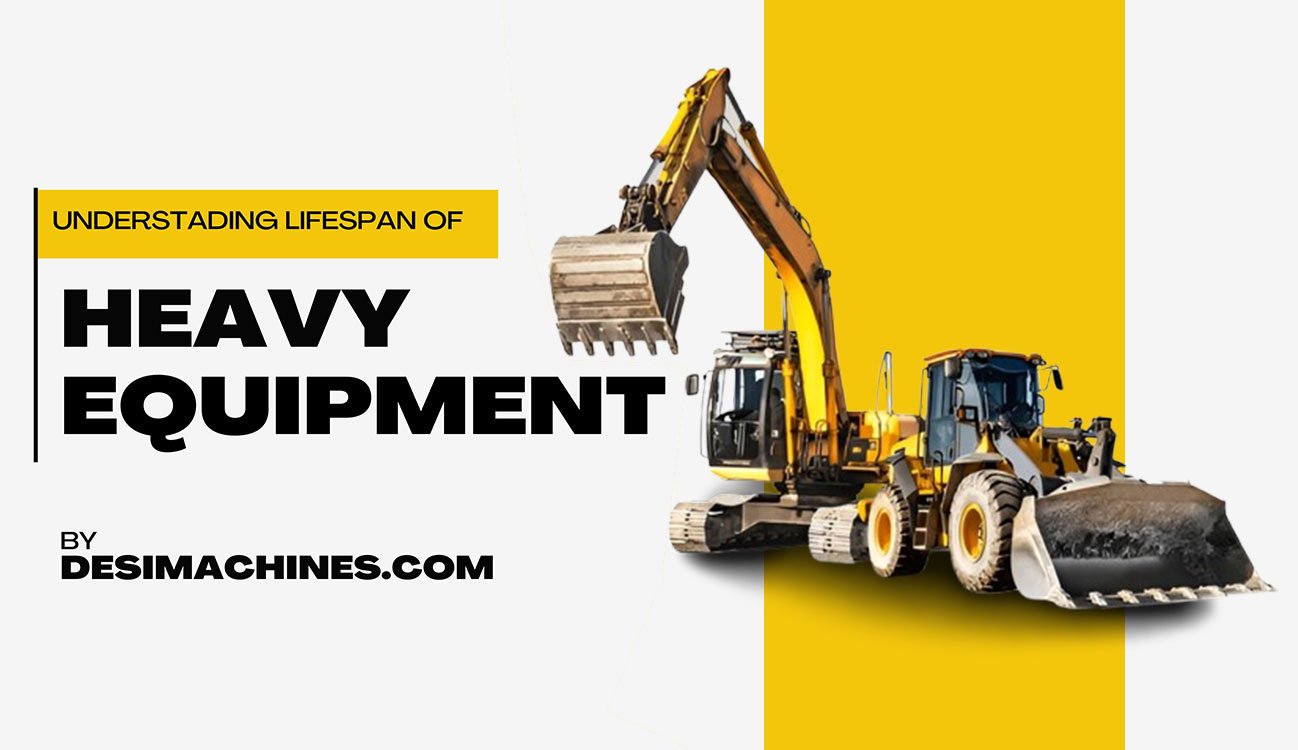Jan 28, 2025
( 0 )

Understanding the lifespan of heavy machinery is vital for maximizing ROI in India’s construction industry. This blog explores how proper care extends the life of excavation machines like excavator machines, mini excavators, and crawler excavators. With rising excavator prices in India and Mini Excavator prices in India, timely maintenance and skilled operation are key to durability and performance.
The construction and mining industry is continuously growing in India and has huge prospects in the future. This is a huge industry and includes the use of heavy machinery. Construction projects are taking place in every corner of the country, from roadways connecting remote places to urban skyscrapers. Heavy machinery and construction equipment are the silent champions behind this huge infrastructure. These heavy machines largely contribute to building a nation’s future. Unlike any machinery, these machines also have a lifespan. In this blog, we will discuss the average life span of the machinery, the factors determining the life span, and how a company can utilize the machine so that it gives optimal performance with less investment.
The average lifespan of this heavy machinery depends on various factors such as operating hours, weather conditions, maintenance practices, and how frequently it is used. Here are the estimates of the average lifespan of the equipment:
| Equipment Type | Average Lifespan (in Hours) | Equivalent Years |
|---|---|---|
| Excavators | 10,000 – 15,000 hours | 10-15 years |
| Bulldozers | 10,000 – 12,000 hours | 10-12 years |
| Backhoe Loaders | 6,000 – 8,000 hours | 8-10 years |
| Skid Steer Loaders | 5,000 – 8,000 hours | 10-12 years |
| Cranes | 15,000 – 20,000 hours | 15-20 years |
| Forklifts | 8,000 – 10,000 hours | 8-10 years |
| Asphalt Pavers | 7,000 – 8,000 hours | 15-20 years |
| Road Rollers | 8,000 – 12,000 hours | 10-15 years |
| Motor Graders | 12,000 – 15,000 hours | 12-15 years |
| Dump Trucks | 8,000 – 10,000 hours | 8-10 years |
The lifespan of construction equipment is influenced by a variety of factors. Here’s a closer look at some of the key elements:
Heavy machinery forms the backbone of development and infrastructure construction for India’s ever-evolving construction and mining sectors. Even though these machines are irreplaceable, their life spans vary widely according to operational environments, maintenance levels, and the quality of equipment used. The organizations involved in application-specific operations must observe regular maintenance schedules, provide effective operator training, use quality parts and fuel, and ensure proper storage of equipment to ensure the engineers get the best out of the machine and prolong its life. It must help the companies in getting more return on investment along with low downtime and sustained growth of infrastructure building in India.
Learn More:
Global Heavy Construction Equipment Market to Trends
The excavator price in India varies from ₹25 lakh for compact models to ₹1.5 crore for large, high-performance crawler excavators. Mini Excavator Price in India starts around ₹18–₹30 lakh, depending on the brand and specifications.
A typical excavator machine lasts between 10,000 to 15,000 operating hours, translating to around 10–15 years of use with proper maintenance and operation.
Top-performing models include JCB 30PLUS, Kubota U30, and Tata Hitachi ZAXIS 33U. These mini excavators are ideal for tight spaces and urban infrastructure development.
For short-term or occasional use, renting a mini excavator or excavator machine is more cost-effective. Buying is more suitable for frequent or long-term use and can offer better ROI.
A mini excavator is compact, suited for urban and light-duty work. A crawler excavator is larger, runs on tracks, and is ideal for heavy-duty tasks like mining and large infrastructure work.
You can visit online portals like Desi Machines, brand websites, or connect with local dealers to get the latest Mini Excavator Price in India, compare specs, and request quotes.
Heavy machines like excavators should be serviced every 250–500 hours, depending on usage. Regular inspections, oil checks, filter replacements, and component inspections are essential.
Resale value depends on machine hours, brand, condition, maintenance history, and market demand. Well-maintained excavator machines from reputed brands fetch higher resale prices.
Yes, several banks and NBFCs in India offer financing options, including EMI and leasing, for new and used excavator machines, including mini excavators and crawler excavators.
Popular and reliable brands in India include JCB, Caterpillar (CAT), Tata Hitachi, Volvo, Komatsu, Hyundai, and SANY.
The Rise of Smart Machinery: How AI and IoT are Transforming Indian Construction Equipment
© 2025 Desi Machines All rights reserved.
Designed & Developed by PromotEdge
Desi Machines is a platform where you can see and compare construction equipment. It showcases images, brochures, features, technical specifications, brand details & dealer information. All these are taken from respective brand websites, brochures, and other public resources. We do not claim ownership of these materials and strive to ensure their accuracy. However, the disparity may happen and we advise users to verify directly with respective brands and dealers. Desi Machines is not liable for any inaccuracies or reliance on the information provided. Use of this website is at your own discretion.